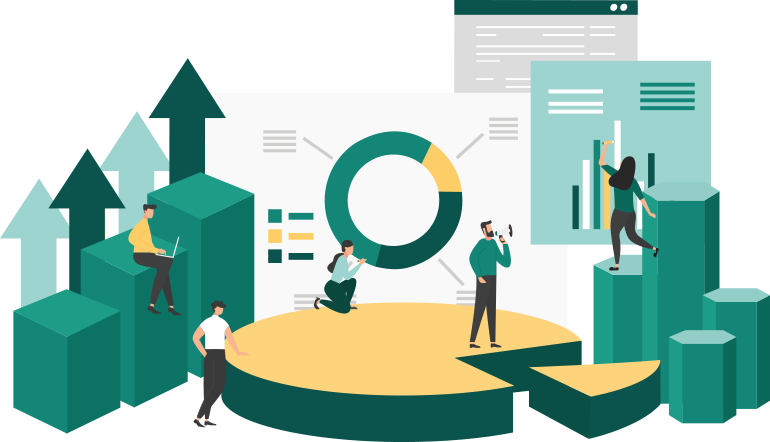Data Driven Business
Data Driven Business
Make informed decisions based on data

Data Driven Business is a style of thinking and leadership in companies in which entrepreneurial action is supported by data in order to make informed decisions and optimize business processes. Thus, intuition and personal experience can be supplemented or replaced by data-driven insights.
Data-driven decisions with Data Driven Business
The idea is to enrich data about existing products and services, thereby making existing business processes more precise, faster and more automated. For each company, a customized strategy is developed on how the data can be integrated into the business model in a way that increases efficiency.


Why data quality is crucial
Accurate data is key to rule- or AI-based decision support in this regard.
The more data is available about the market and the company’s own products and services, the more precisely and reliably processes can be optimized. Although the amount of information in companies is growing unceasingly, the quality is often uncertain or even insufficient. Additionally, the management of enterprise data takes place in distributed silos, which means that data is not available across the enterprise.
Data quality is a competitive advantage
The systematic collection of historical operational and market data gradually allows to continuously increase the level of data transformation and automation and to optimize the accuracy of decision support.
The better the data quality, the more logical the business decisions – an unbeatable competitive advantage.


Grasping change as an opportunity with Data Driven Business
The transformation to a data-driven business places high demands on management, the organization and all employees. What is needed here is “leadership by example,” a cultural change controlled from above to involve all areas of the company.
Digital transformation from a business perspective makes it clear that change offers an opportunity to optimize business processes and models.
How to get started in data-driven business
Digitization projects are complex and cannot be planned completely with certainty. That’s why we follow the “think big, start small” approach to ensure your long-term competitiveness.
Crucial to this are a use case-based approach and agile project methods. In this way, new findings and framework conditions can be taken into account on an ongoing basis.
With our phase model, which runs in an agile loop, your entry into the data-driven business will also be successful.
2. Create & prioritize use cases
3. Praxistest des Use Cases (Proof of Concept)
4. Validation of data structure, availability & quality
5. Business Case Solution Design (Organization, Technology, Architecture, Data)
6. Implementation & roll-out
With SMF's Data Hub concept to Data Driven Business
In principle, a data hub is suitable for companies that previously managed their own corporate data in distributed silos, which meant that it was not available throughout the company.
- By the term Data Hub, we mean a universally deployable, data-centric solution. This combines the modern approaches of data lake and data warehouse, supplemented by platform functionalities.
- It represents a "hub" of data for the systematic collection of operational knowledge and contains all relevant, historical and current operational and market situation data in a structured form.

Digital transformation thanks to Cloud Native
Our Data Hub concept is based on cloud-native implementations, the ideal means for Data Driven Business. Cloud Native means that the strengths of modern cloud services (hyperscalers) can be used optimally. A shift from classic lift and shift to modern architectures is the key factor for Digital Transformation.
Advantages of the SMF Data Hub concept
Take advantage of a data hub and enable data-driven decisions and business processes based on verified facts.
Consolidation
Unified data pipeline
Data access possible at any time
Long-term backup, archiving
Independence from change
End-to-end consideration
(Ad-Hoc) Analyses
Fast connection
Optimization of everyday operations
Data-driven predictions
RWE success story
Your contact
Together we determine your individual needs and coordinate your wishes and goals. Please use the contact form and we’ll get back to you as soon as possible.
Torsten Schlutow

Arrange a free consultation
mandatory for all enquiries about our offers.*

